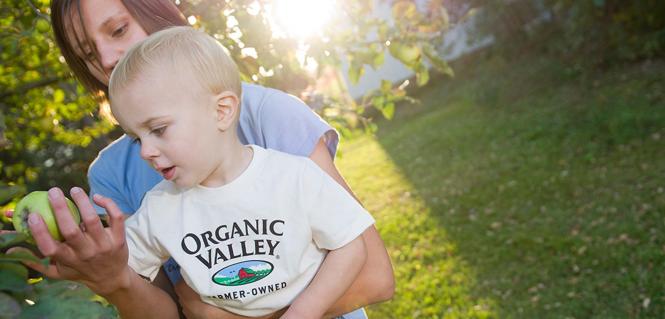
In the age of information, consumers want to know where their food comes from. Was it grown locally? How long did it take to travel to my plate? How much fuel was used in its transport? As the internet and technological advances make it easier for consumers to find information, organic businesses and producers are becoming even more transparent about their supply chain. This helps maintain their customer base of ecologically minded, conscious consumers who want to be part of the solution to many of the problems facing our world.
Organic Valley Co-op (who, like CCOF, partnered with the USDA to co-author the organic standards) is one of many businesses stepping up to this challenge by providing traceability sources on its website. By inserting a zip code, consumers can see the operation that produced the dairy products they purchase. Organic Valley has always maintained positive relations with its community because it is a cooperative– a path fewer and fewer businesses have the option to take in the current economic climate. Now Organic Valley is more connected to their customers than ever, providing specific source information about their products.
Before 2020, consumers were already asking the question, “Where does my food come from?” With the coronavirus pandemic creating more health concerns, those who were on the fence about organic have made the switch, feeding their families more organic products to keep their immune systems healthy. Now, parents can hand some research off to their tech-savvy kids by asking them to look up who made the milk they are drinking.
Forbes.com quoted Ahmed Rahim, founder and CEO of Numi Organic Tea on increased consumer awareness in 2019:
The brands consumers eat, drink, and wear have become an expression of who they aspire to be, which is why they seek out a company’s origin story, sustainability efforts, social consciousness, and corporate transparency.… Consumers are seeing their purchasing decisions as a form of activism–they are “voting with their dollars,” supporting companies that align with their personal beliefs and hope for the future. There are pioneering companies that have embodied these sustainable values before it hit mainstream consciousness, and now we’re seeing the broader food industry get on board.
The CCOF Foundation thanks Organic Valley and the Organic Valley Farmers Advocating for Organic (FAFO) for their continued support of our Future Organic Farmer Grant Fund that assists organic students and teachers.
Source:
Olayanju, Julia B. (2019, February 16). Top Trends Driving Change In The Food Industry. Forbes.com. https://www.forbes.com/sites/juliabolayanju/2019/02/16/top-trends-driving-change-in-the-food-industry/#1b99ce760633